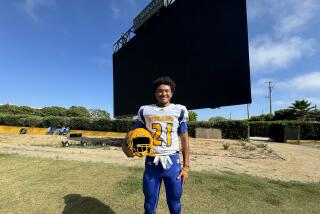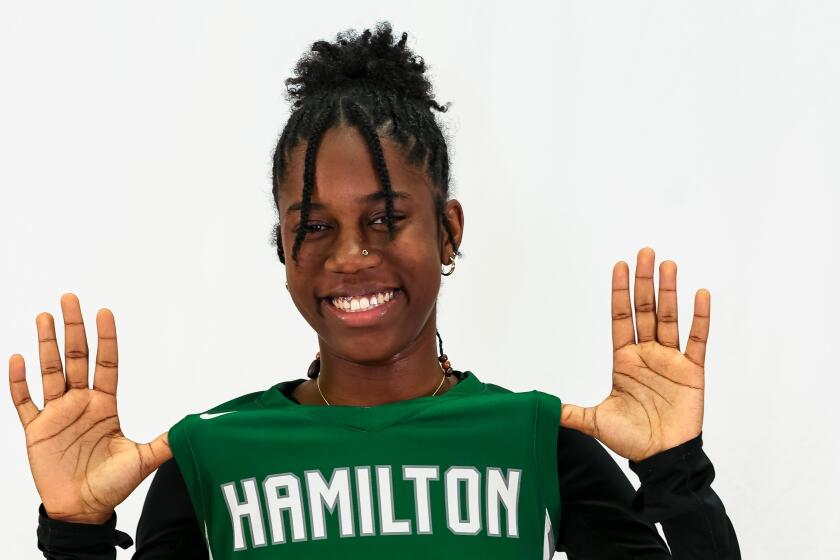HE HATES DECISIONS : But Former St. Bernard Star Decided to Play Pro Ball, Wait on College
Decisions are hard for her son, Royce Clayton’s mom will tell you.
“When he was 3, I would ask him, ‘Do you want bacon and eggs or bacon and pancakes?’ It would drive him nuts. He hates to make decisions”
But the good side of facing a choice is having one, and certainly there have been many choices to make concerning the future of Royal and Antoinette Clayton’s youngest son.
Royce, a St. Bernard High baseball star and California prep Player of the Year, signed with the San Francisco Giants after graduation in 1988. The Giants cashed in their first-round pick--15th overall--for the shortstop who had led the Vikings to three straight CIF playoff stints.
Clayton’s caliber of play was never questioned; the Baltimore Orioles were so high on him that they were set on using their pick, fourth in the entire draft, on Clayton until a prize pitcher became available.
But first Clayton had to wrestle with a big decision. Also beckoning for his baseball services were several major colleges, including USC, who were offering full scholarships.
Clayton chose to temporarily shelve the college education to pursue his lifelong dream of playing pro ball. He played rookie ball last year and spent the first part of this season in Class A Clinton, Iowa, before being promoted to the Giants’ top Class A club in San Jose on July 29.
He and his family have no regrets in taking the baseball path more often traveled by promising prospects.
“Did I make the right decision?” Clayton asks, repeating a question he’s been asked many times. “It all depends on how you look at it. This (pro baseball) is my college right here, for now, anyway. I’ve learned a lot of things outside of baseball in the minors. As far as a business decision goes, it was the best decision.”
And career-wise it may not have hurt him either, since the Claytons are still planning on Royce working his way toward a degree in the off-season. A student with a B average at St. Bernard, Clayton’s academic standing was more than suited for a university. His parents helped ensure a quality education by enrolling both Royce and older brother Royal in private schools throughout their youth, with the payoff to be a pair of college-educated sons.
Royal took the prescribed route and graduated with a degree in psychology from UC-Riverside after three years at Arizona State. A fine college pitcher, Royal is pitching for Class AA Albany-Colonie in the New York Yankees system.
“I look at sports this way,” says Royal, the father. “No matter how good you get, you need to have the complete package, with an education, to fulfill yourself. We live in a society today where education determines your income.”
The youngest, Clayton is well aware of the rewards of college, and only the opportunity afforded to a first-round draft choice was enough to put them on hold. Clayton admits his selection slot, and not just playing, had everything to do with his plunge into the minor leagues.
“Even if I was taken as high as the second round, I wouldn’t have done it (signed a pro contract). I would have probably gone to USC,” the 19-year-old said. “But I went in the first round, the financial situation was great and the Giants are a great organization.”
San Francisco has agreed to help Clayton obtain the education he has put off. At Royce’s father’s insistence, the club wrote an educational stipend into his son’s contract. The team will shell out $12,000 to any university Clayton picks to work on his degree. He’s leaning more toward attending UCLA for off-season study than USC--his original choice out of high school.
In contrast, former St. Bernard teammate Tim Williams is entering his third season--and junior year --at Loyola Marymount, playing center field for Coach Chris Smith’s Lions.
There’s a definite reason, says Williams, for Clayton’s smooth transition to pro ball at such a young age:
“He’s very mature for his age. His head’s on straight. He won’t let his offense affect his defense. He’ll go 0-for-4 and still play good in the field. And he’s a really good ball player.”
Williams concedes that the outlook a pro team gives a high school prospect will play a huge role in choosing between college and the minor leagues. Selected 29th in the draft out of high school in 1987, Williams said he never seriously considered signing because of his low selection.
But for Clayton, being a high pick helped in his decision more than he thought. “There would have been a lot more pressure if I had gone to college being a No. 1 pick. No. 1 picks are supposed to tear up college,” he said.
Although the process has started slowly, Clayton hopes to someday tear up the pros. He was batting under .200 overall when he left Clinton but helped his early season slump by hitting over .310 during June and July. His main talent, though, is fielding.
“There’s no doubt about it. Any team would need my kind of defense.”
Says Bob Yarnall, Clayton’s high school coach: “That’s his main strength, his fielding. When he walks out to take the field, you can ask anybody watching who they think the best player appears to be, and they would probably pick out Royce. He really has himself composed and plays that way too.”
If he keeps it up, it will make his decision a lot easier--the one that drew mixed reviews from his family--to take up pro baseball now and to hit the books during the off-season later.
And about those dreaded breakfast decisions as a child? Says mom Clayton: “He would say ‘Both,’ and I would tell him, ‘No, you can’t have both, you have to make a choice,’ ”
Concerning pro baseball and a college education, the son has made a choice, and it is to do both.
More to Read
Go beyond the scoreboard
Get the latest on L.A.'s teams in the daily Sports Report newsletter.
You may occasionally receive promotional content from the Los Angeles Times.










